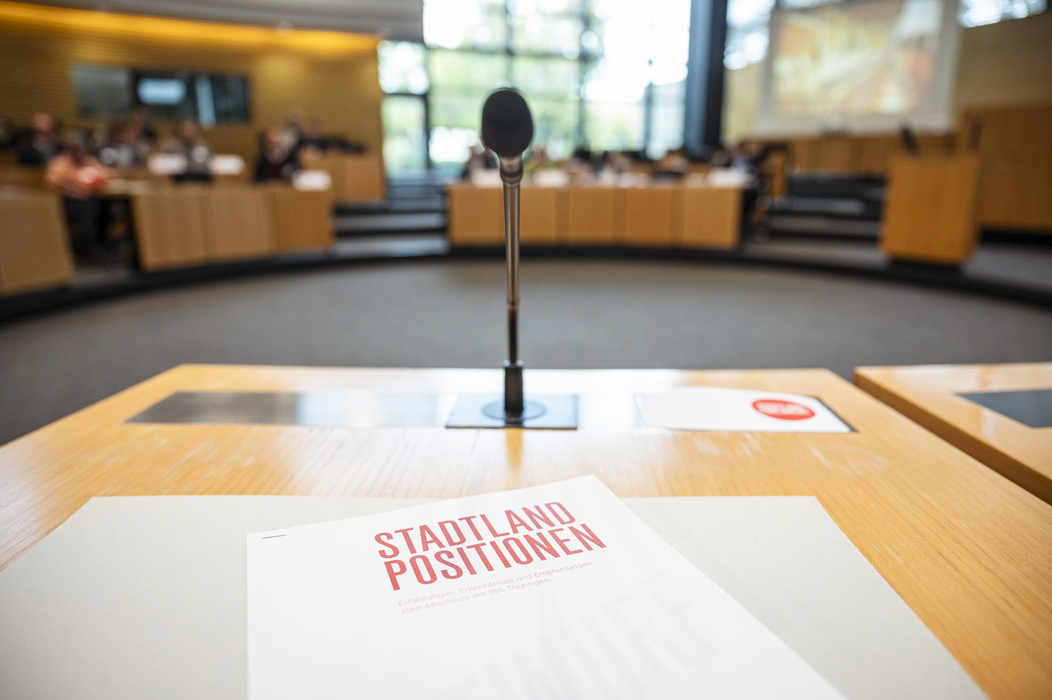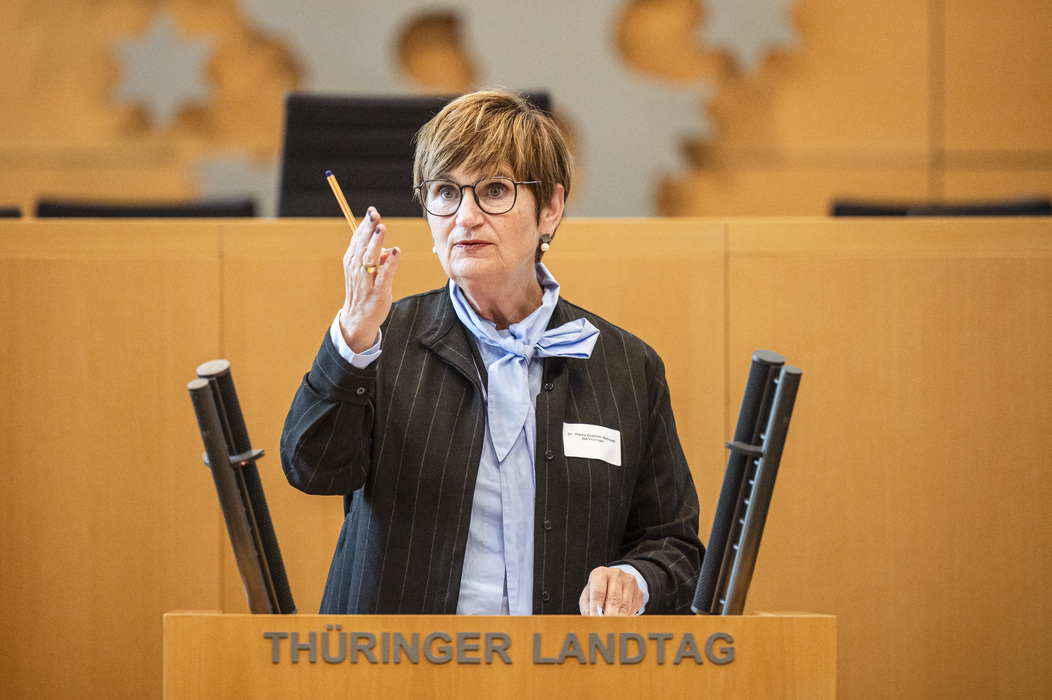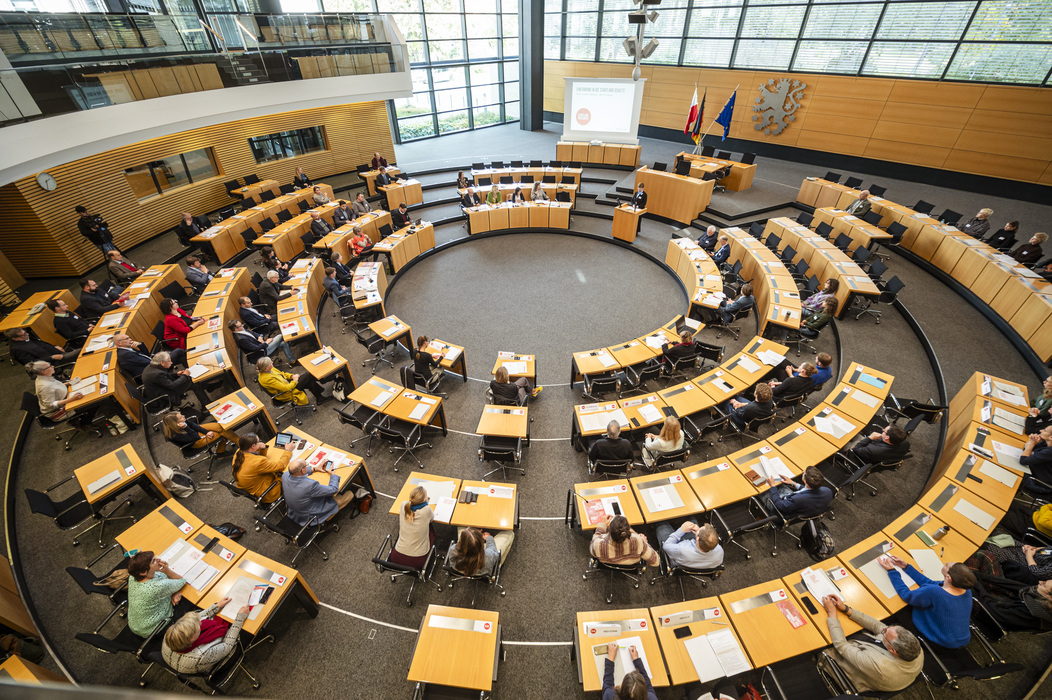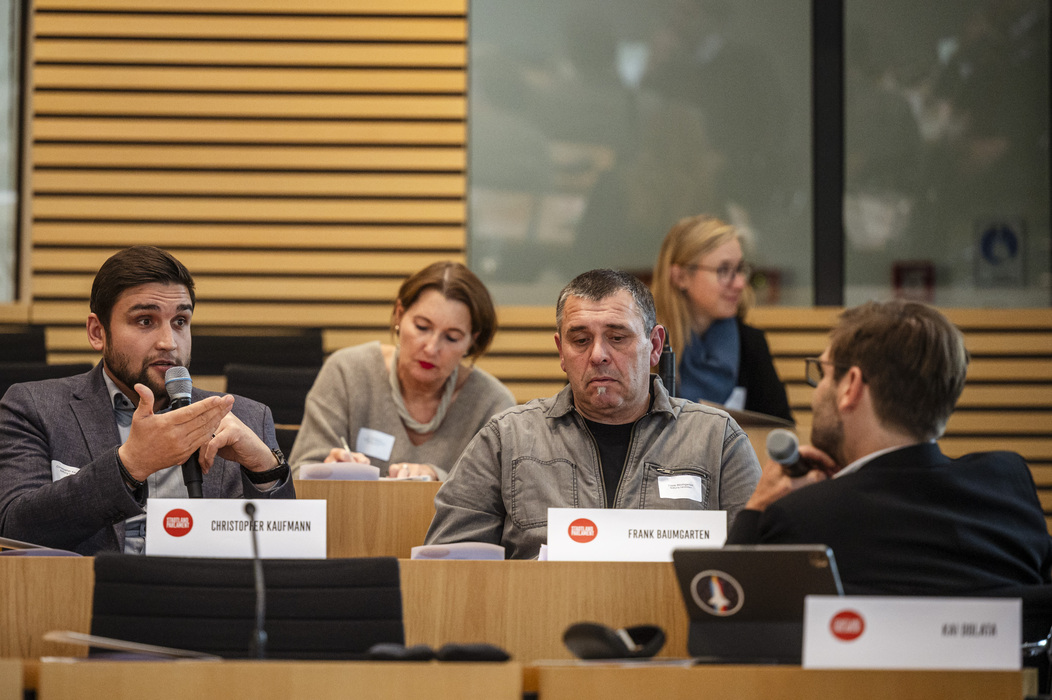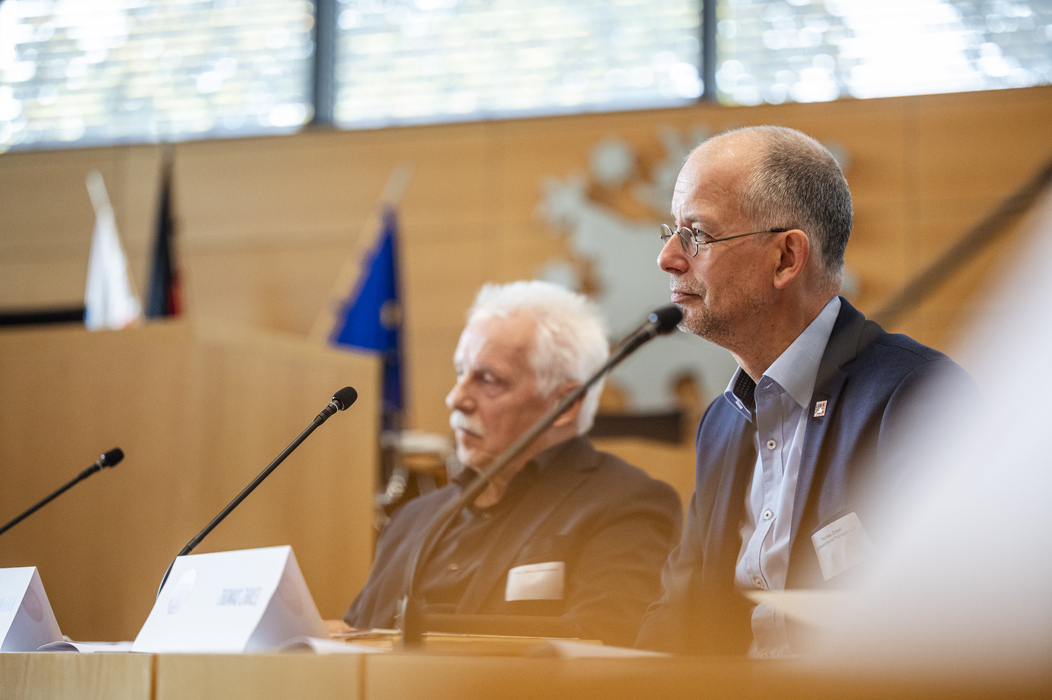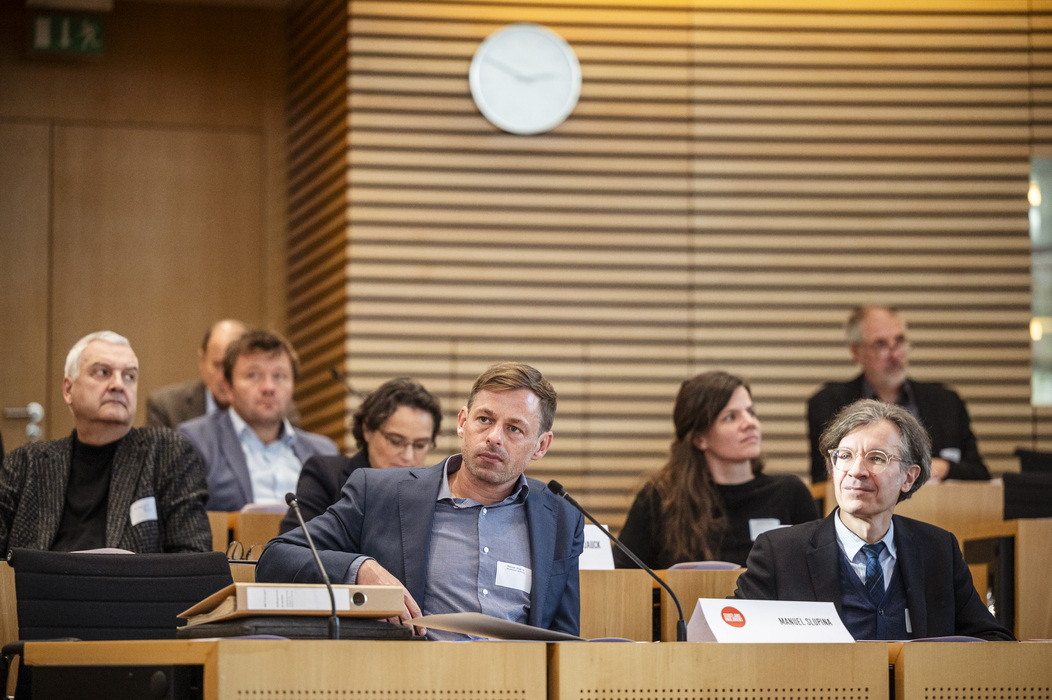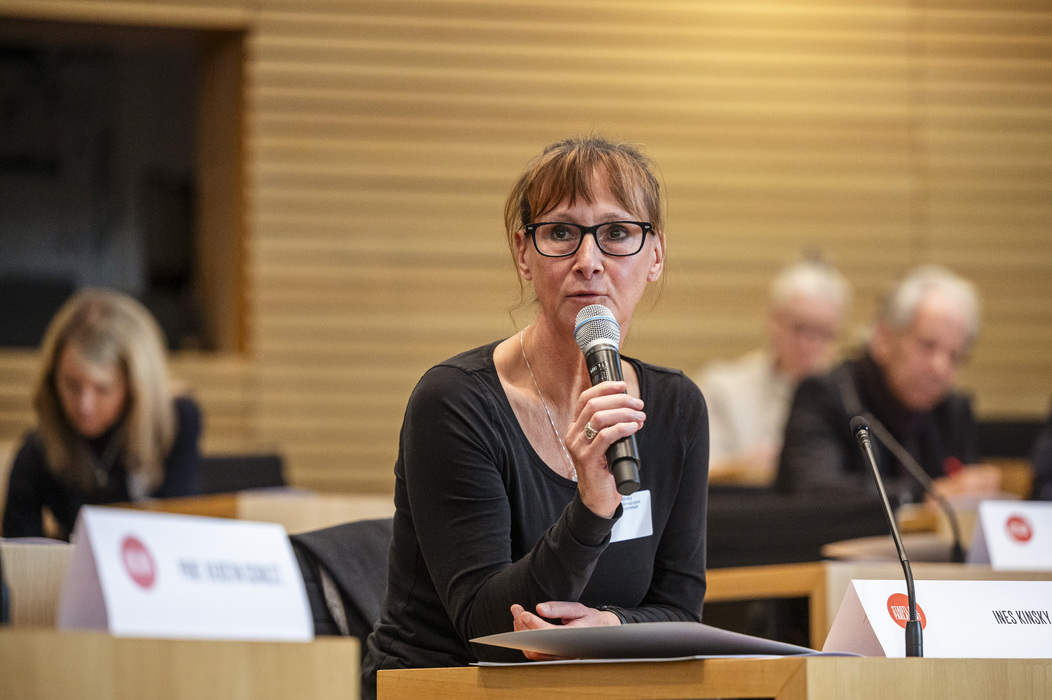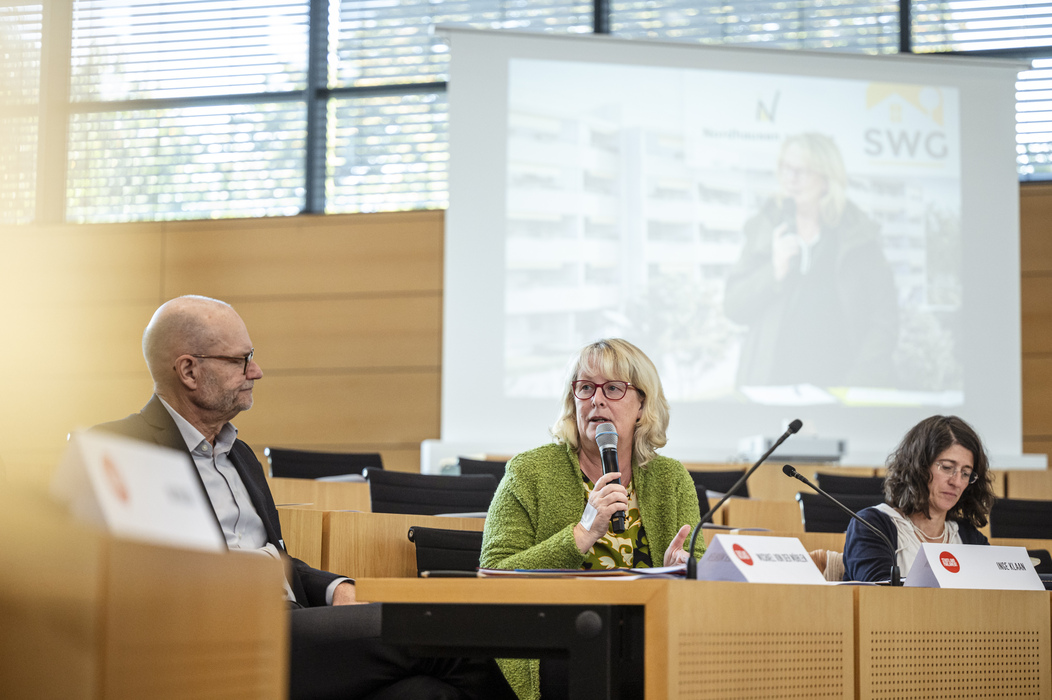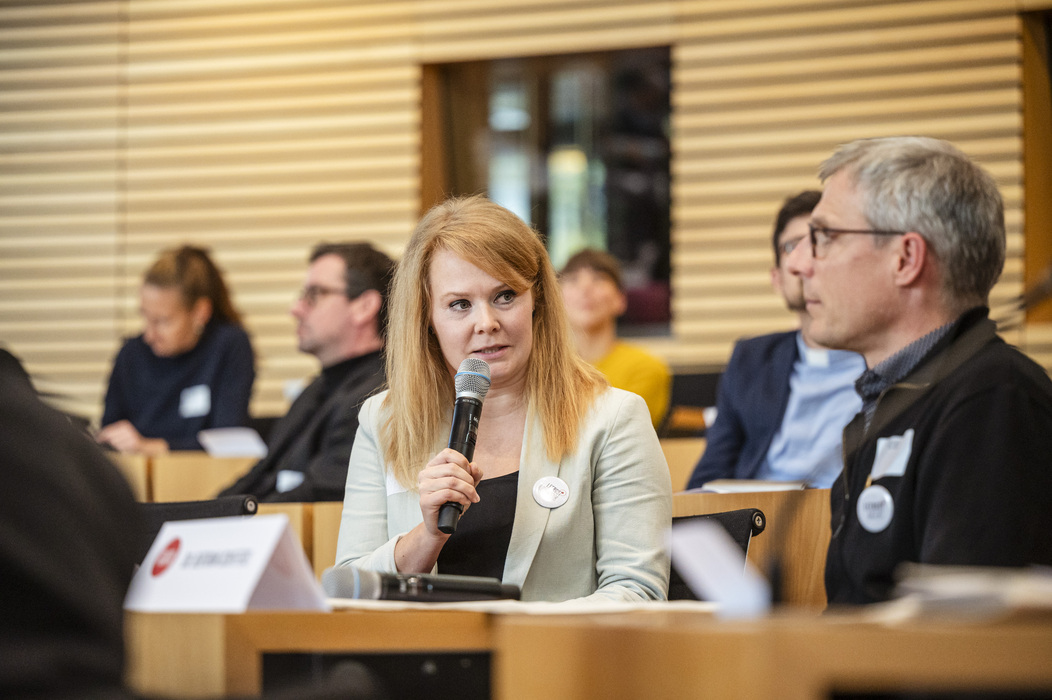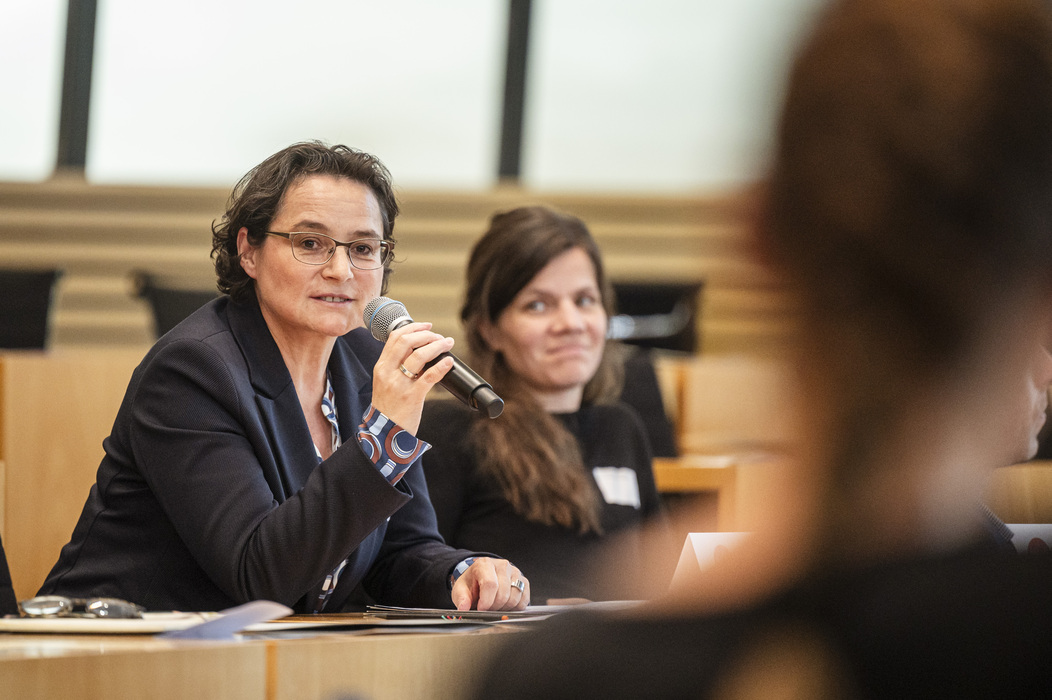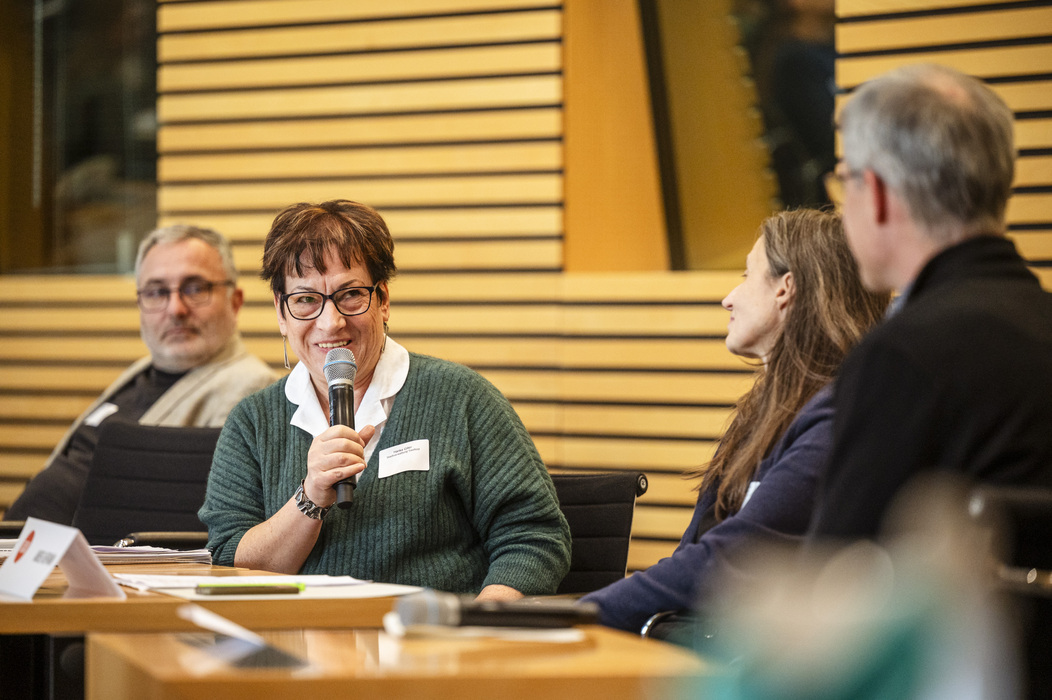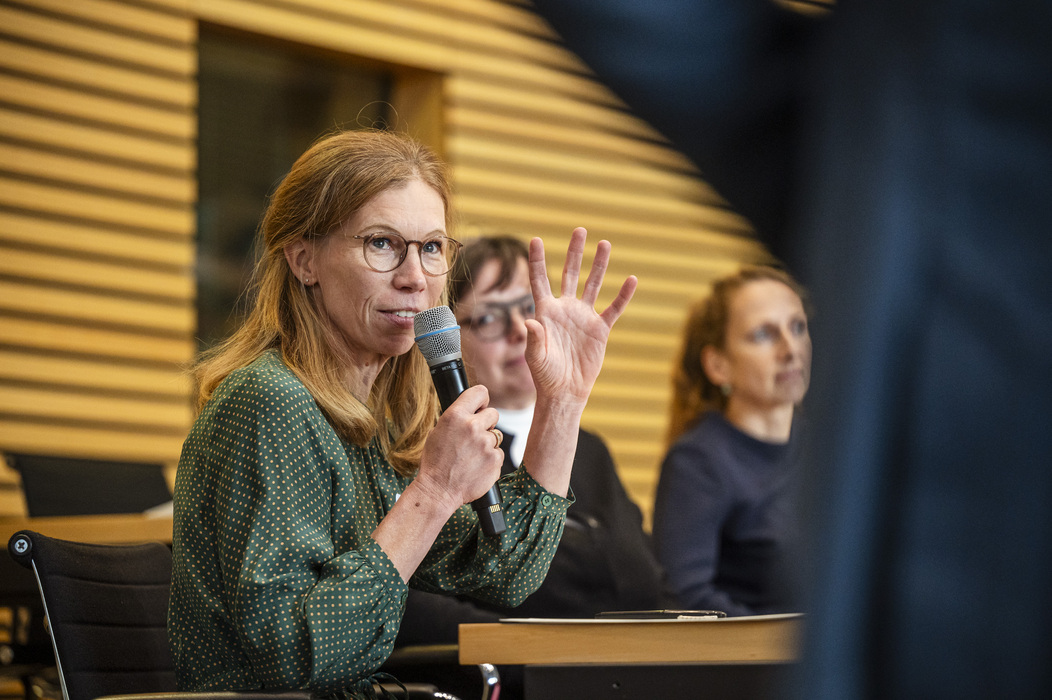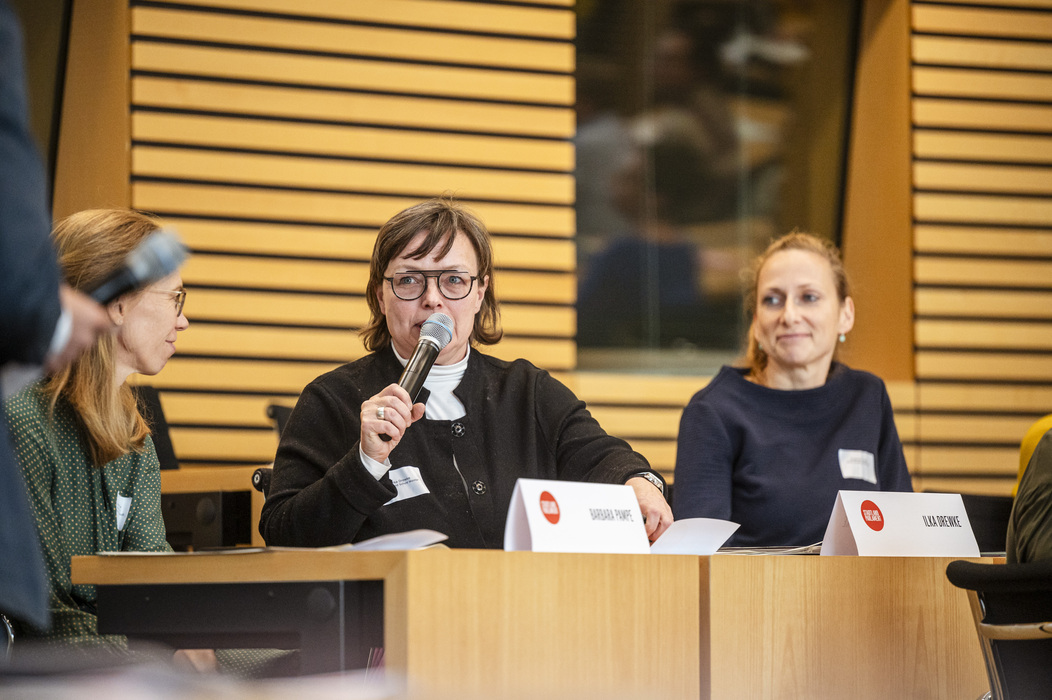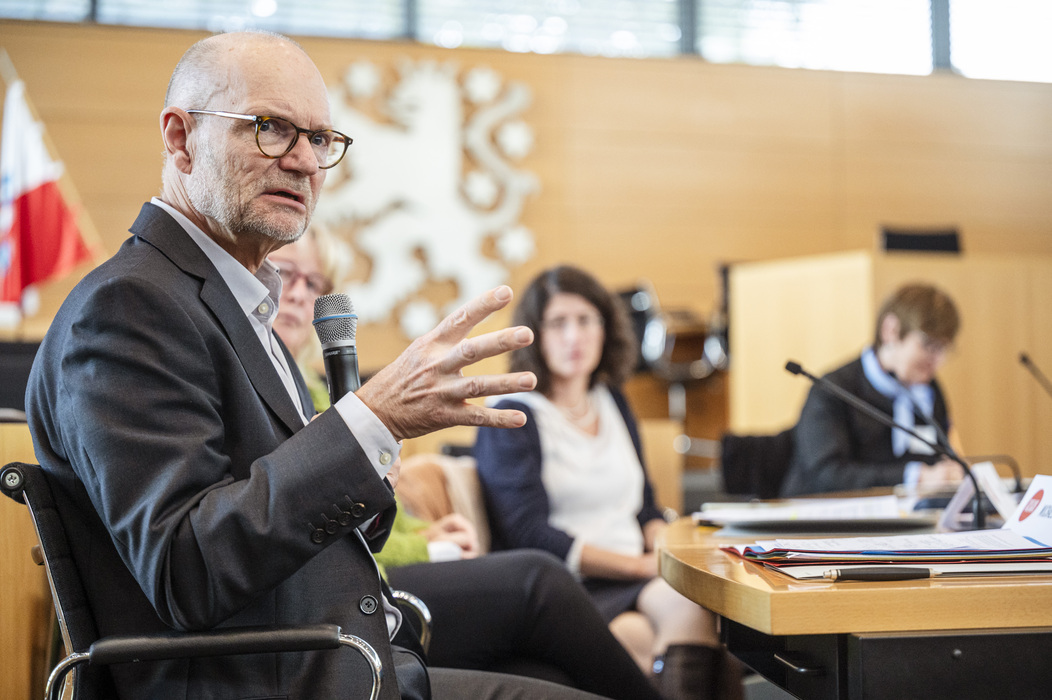Positions on StadtLand
⸺ Experiences, insights, and recommendations for the conclusion of the IBA Thuringia
In 2012, the International Building Exhibition (IBA) Thuringia was initiated, ending in 2023. Together with cities and municipalities, governmental bodies, supervisory and advisory boards, companies, associations, cooperatives, private initiatives, and individuals, it has developed resource-conscious projects with values that are oriented towards the common good in and for Thuringia: innovative, experimental, and exemplary. About 1,400 people belong to the narrower and more extended IBA network. IBA’s experiences, findings and recommendations are summarised in the following position paper, which will be presented in the Thuringian Parliament on 18 October 2023. It addresses politicians and the administration of the Free State of Thuringia as well as important allies in the development of the country. The IBA Advisory Board was involved in its elaboration.
From June to September 2023, the Thuringian IBA stakeholders exchanged views with over 600 actors in a multi-part debate format on the future of rural spaces. This StadtLand Forum [Urban-Rural Forum] was organised by the IBA Thüringen [IBA in Thuringia] and the Wüstenrot Foundation. The forums were a supra regional platform and place of learning in one and an important milestone for the StadtLand Position Paper.
From June to September 2023, the Thuringian IBA stakeholders exchanged views with over 600 actors in a multi-part debate format on the future of rural spaces. This StadtLand Forum [Urban-Rural Forum] was organised by the IBA Thüringen [IBA in Thuringia] and the Wüstenrot Foundation. The forums were a supra regional platform and place of learning in one and an important milestone for the StadtLand Position Paper.
StadtLand Thuringia:
Home in the world
The Thuringian settlement structure is small-scale, historically rich and scenically beautiful. About 90 percent of the country can be characterised as rural. The IBA Thüringen calls this StadtLand. The occasions for holding an International Building Exhibition resulted from the unequal demographic development between the city and countryside, as well as from structural and climate change processes. They condensed in the course of the IBA under the influence of mutually reinforcing crises, affecting the city and the countryside alike. Furthermore, they range from the regional level up to the global scale. Instead of obsolete contrasts between the city and countryside, the IBA has looked at the linkages. StadtLand as practiced by the IBA Thüringen subverts the hierarchical gradient from the centre to the surrounding area and to the periphery, where the countryside was very often on the losing side. Today, it becomes clear that the mutual playing off between cities and countryside is no longer a factual or political option. Equitable, balanced urban and rural spatial development is part of the planetary topic of climate change containment. Both are related; in the end, Thuringia is part of the world. With StadtLand, IBA Thüringen has written a new narrative and the IBA project processes across the country are its chapters. This narrative was ideally unfolded in the Free State of Thuringia. Here, committed and creative individuals have initiated project processes that point towards the future. This is where communication took place at eye level. Ideas became concepts; plans became a reality. Despite the more difficult conditions and the great “world concerns” that are currently preoccupying many people, the IBA has shown: it is possible! In our part of the world and in a democratic society, we are able to shape our future. Now it is important to learn from the experiences and insights from the IBA project processes and consolidate them.
What it is about
Justice and regional empowerment
Since its beginnings, the work of the IBA Thüringen has taken place within a rapidly changing social environment. Rural areas in particular have become a political priority in recent years. An ongoing political stress test for the democratic cohesion in a society cannot only be found in rural areas. It is linked to the accusation of being ‘left behind’, too. Thus, the constitutional principle for equal living conditions has returned to the agenda. It has become a question of justice. Although most people arrange themselves in a practical way – where to shop, how to get to the doctor, when to take the bus. Nevertheless, their overall flexibility is overstretched. More than that: they often miss the perception of their worries. Therefore, a new perception of public services must be designed, politically negotiated and implemented. Actors must be empowered to shape their own ideas of a good life on site. The village shop, the village pub and the village taxi can also be included. As regional commons, they get a chance. Of course, it cannot be left to the citizenry or civil society alone to close supply gaps. Rather, new, smart and flexible cooperation models and governance structures are needed – private, municipal, governmental, civic. Moreover, volunteering needs employment.
Climate protection and necessary transitions
Climate protection and necessary transitions
Climate protection and adaptation must become the foundation of all action. The building sector alone is responsible for about 40 percent of climate-damaging CO2 emissions. Therefore, the reversal of construction is increasing urgency and haste. Conversion has to be the priority. Where construction from scratch is still taking place, renewable and recovered building materials from the region are to be used preferentially. Thus, the material and energy relations between the city and countryside prove themselves in regional interaction. Sustainable agriculture and forestry in rural areas will play a central role in the future. Where should renewable energies and renewable commodities be ‘harvested’, if not in the countryside? How are circular models of use and reuse organised, if not within the vicinity? Fierce competitions are already taking place in the area today: Plate or tank, agriculture or nature conservation, wind turbine or beautiful view. An answer to such conflicts can only be given convincingly with an integral perspective. We need diversity rather than ‘monolandscapes’. If integrated development succeeds, the countryside will prove itself as a location for qualified and well-paid work, for meaningfulness and value-adding. There will be good reasons to live in the countryside again.
Vacant properties as resource: "LeerGut"
The building stock is storage and grey energy. It is a collective memory, representing an economic value and constitutes a reserve of space and potential for use. The StadtLand Thüringen has opulent inventory, valuable houses, protected ensembles – and a high vacancy. Current nationwide studies show that interested parties from the city are increasingly looking for domiciles in the countryside. The Thuringian StadtLand has much to offer in this respect. However, there is still construction from scratch in prospering areas and on new ground. In order to foster climate protection, the potential of the inventory must be tapped. This also means strengthening the StadtLand exactly where the empty buildings are located. Reusing unused buildings provokes curiosity and enables creative interim utilisation. Revaluate a vacancy and you get a LeerGut – a resource. We should ask ourselves: How little is enough? This leads to simple solutions: resilient, less risky, less expensive as well as sustainable.
Arriving StadtLand
In Germany and Europe there is a debate about migration policy with an open outcome. Meanwhile, refugees seek security, perspective and opportunities. On the other hand, workforce is sought for in crafts, care, gastronomy, etc. Demand and need come together with difficulty and too slowly. In the view of demographic change, Thuringia needs immigration. The goal must be a successful integration. This is also beneficial for the labour market, where refugees find meaningful employments, contacts and opportunities. Social projects, art and culture enable encounters and understanding.
Enabling policy needs enabling structures
Transformational tasks are new territory. Here, new procedures and design methods have to be tested. Within the framework of the IBA Thüringen, numerous committed, creative and persistent actors have found and implemented their answers to the great social requirements ‘on their doorstep’. They were the human resources of this IBA, they are also the avant-garde for future changes. This explicitly includes supporters in large societies, municipal administrations, politics and ministerial structures and authorities. But everywhere, it must be noted, the effort required for the upcoming new and mostly additional tasks is very high – and the political price of failed projects and disappointments as well. We need a culture and a practice for the brave. Therefore, a policy framework for enabling structures should be set up. People who are preparing for change need trust, practical guidance and political backing.
Giving "change" a face
Transformation processes need to be shaped. Construction culture is not a decoration; it is rather about making changes visible and creating comprehensibility and acceptance in this way. Conversion culture, timber construction and building with renewable building materials can become a contemporary, regional trademark ›Made in Thuringia‹. The buildings, new ensembles and landscapes that have been empowered in this way can even become a tourist destination in Thuringia thus attracting more interested parties. Outside recognition strengthens the solidarity within communities, municipalities and regions. The “Stiftung Baukultur Thüringen” [Thuringian Foundation for Building Culture] will continue the communicative heritage of the IBA Thüringen after 2023.
Recommendations
StadtLand means widening the perspective. For many of the upcoming transformation tasks, the region is the appropriate space for action. Here, StadtLand relations become specific; the regions make sure of their own resources and talents. Formats of cooperation on a regional scale which have already been tested elsewhere (e.g. regional festivals) are to be tested, adapted and developed for their suitability for Thuringia.
Since 2015, the “Tag der Sommerfrische” [revival of the tradition of “Sommerfrische”, a retreat to cooler climates during the hot summer months] has been held annually. From its beginnings, it has developed into a regional festival. Thousands of visitors have so far come to the region Schwarzatal for a diverse and entertaining program.
Since 2015, the “Tag der Sommerfrische” [revival of the tradition of “Sommerfrische”, a retreat to cooler climates during the hot summer months] has been held annually. From its beginnings, it has developed into a regional festival. Thousands of visitors have so far come to the region Schwarzatal for a diverse and entertaining program.
Climate protection and adaptation are of paramount importance. This is where all actors and all levels of action face new, comprehensive and complex tasks – in the shortest possible time. The responsible persons, on the other hand, must not only be obliged, but they also urgently and quickly need the regulatory, financial and human resources requirements in order to operate successfully.
The climate design plan of the city and the district of Nordhausen shows what a climate-neutral energy transformation could look like in an interlinked urban-rural climate region. The concept is designed in such a way that it can be incorporated into formal plans such as regional plan, land use plan, landscape and development plan.
The multi-talented Ossietzkyhof in Nordhausen-Nord serves as a blueprint for the transformation of quarters towards energy independence. The model is based on the instruments currently available (Building Energy Act, Energy Industry Act, Heating Cost Ordinance, Promotion Programme, etc.) and it shows new ways in which the energetic renewal can be organised.
Soil is not multipliable. Public interest-oriented development intentions as well as climate protection and sustainability goals are much easier to achieve with real estate and land ownership in common ownership. This can also inhibit speculative purposes, both in residential areas as well as in agriculture and forestry. A pre-emptive right for municipalities, a state-owned land fund and similar instruments can effectively underpin this.
The IBA has set up the special fund ›StadtLand Thüringen‹ at the “trias Foundation”. The foundation uses its income for non-profit purposes. It supports the Thuringian actors, and the use of funds is decided jointly. The special fund was to be supported by the Free State of Thuringia and used for the further development of “Thüringer Immovielien” [real estate for the many – Immobilien für viele].
For agricultural land in Kannawurf, there are elaborated proposals for a climate-culture landscape, some of which have already been implemented. The transformation to sustainability goals serves agriculture, for example, it protects against soil erosion. However, there are limits to implementation on the leased areas, which must be overcome.
Within the framework of the IBA Thüringen, places have been created by many for many and with them clever forms of organisation and operator structures. Cooperatives, associations, foundations and social entrepreneurship, for example, are also to be promoted in the future. They don't necessarily have to generate a rich return. Breaking even and the sole reduction of losses count as success.
In Rottenbach, the municipality acquired the vacant station building and refurbished it with the help of urban development funds. By creating landscape islands, the forecourt became an attractive transport hub. Since 2019, the specially founded local cooperative successfully operates the railway farm shop.
Health care and care for the elderly are becoming a major societal challenge. They must not be subordinated to economic interests alone, because they contribute to the quality of life and avoid social isolation, especially in rural areas. Project experience of the IBA Thüringen can multiply in the area. To improve the conditions for getting older and staying healthy in the countryside, many more ideas and experiments are needed. Health care and care must be developed cross-sectorally, outpatiently and more effectively than before.
The community-wide “Landleben Foundation” and the “Association Landengel e.V.” are developing a new health and care network for the rural region of Seltenrain. Contemporary timber construction gives the four health kiosks and the centre “Landzentrum” a modern face.
In order to implement regional cycles in practice, the possibilities of public procurement law in favour of the use of regional resources should be strengthened. Specific requirements on environmental criteria can support procurement-proof implementation.
On the Thuringian Sea, the SEZ Kloster (sea sports and experiential education center) creates a unique wooden architecture. The state funded the project, ThuringiaForst and an industrial partner from the region were acquired as central cooperation partners. Thanks to this cooperation, the value chain stays in the region: the timber construction is made exclusively with wood from the region.
To achieve sustainability, the reuse of construction materials and components must be promoted. Simple rules and criteria catalogues can be developed and made available to the project manager. Necessary testing procedures should be made possible without major obstacles. Classification as waste must be avoided by appropriate rules. A “building resource passport” has to be created and kept available for new buildings.
At the “Werkhaus” (meeting center) on Beulwitzer Straße in Saalfeld, the structure and equipment are reduced to a minimum. Under the technical guidance of the manager, residents also participate in the remodeling. This is where recycled material, obtained in an urban demolition project, is used.
Projects contrary to the country’s climate targets are already inadmissible. For this purpose, specific CO2 values must also be specified as a permit requirement in construction. These requirements are regularly adjusted and complied with the targets. Corresponding CO2accounting methods must be defined uniformly and the corresponding software shall be made available free of charge.
In Nordpark Nordhausen, the planning approach follows the principle of maximum sustainability. For example, surfaces are unsealed and rainwater leaked. Instead of constantly new materials, existing elements are reinstated. The planning office has modelled the CO2 consumption for the project in order to optimise the planning in all service phases in a climate-friendly manner. This climate tool should be made applicable to future open space planning.
For important construction projects, as a requirement for funding, a professionally accompanied phase of demand and programme development should be defined. In the participatory processes, the future users are crucial. The so-called phase zero should be classified as eligible for funding, as should be the evaluation of operations (phase 10).
Under the supervision of an experienced school construction consultancy team, an intensive development and negotiation process, the so-called ‘Phase Zero’, was carried out at the StadtLand school in Weimar. Students contributed their expertise as well as the teachers and the parents. The jointly developed school concept is currently being implemented.
Recurring construction tasks should be communicated as models and the knowledge gained to be offered for use. Publicly funded planning knowledge is thus made publicly available. The agreement on extended usage rights (open source) in the planning contracts simplifies the further development and follow-up of good practice and increases planning reliability. Legally secure recommendations must be made available to the public contractors.
The digital platform ›School Construction Open Source‹ was developed by the Montag Stiftung Jugend und Gesellschaft (independent charitable foundation) so that many municipalities can benefit from the Weimar model “StadtLand school” for innovative School construction. As a result, all planning knowledge is available to interested parties in other cities and federal states with this comprehensible digital planning tool. Imitation and further development are legally possible, even intended.
Binding, committed and ongoing process support is urgently needed: transformation guides. In view of the force of new challenges, they are not only necessary or helpful for particularly small municipalities with limited staff resources. Their activities can be institutionalised and financed in different ways, but the key point is always to consistently side with the actors to be advised and to accompany them over many years.
For five years, LeerGut agents have been an effective Thuringian network to revive vacancy. They see themselves as a Thuringian lobby for a common good-oriented real estate development, for the conversion and reuse of houses and ruins, as well as for a construction culture that generates innovations in planning, financing and promotion. The association needs reliable basic financing in order to successfully use the great demand for the know-how of the contributors and those involved.
People are making changes. One can provide the actors with quick support and ‘small money’. This applies in particular to the initiation phase and participation processes. For non-professionals in particular, small contributions are a non-bureaucratic aid, that expresses trust at the same time. Excellence and innovation in the implementation of transformation tasks should also be appreciated. For example, project-sponsors who demonstrate a particular quality in climate protection could earn bonus points. Their own contribution of future funding could be reduced in this way.
The LeerGut bills of the LeerGut agents, which have already been tested with the IBA, have achieved great impact with a small financial commitment. In the future, they can be integrated as an eligible advisory offer in LEADER funding (centrally in the Thuringian networking centre or decentralised and voluntary at RAGs) as well as in urban development promotion.
Even after the IBA, experimental spaces for open project processes should be made possible. Similar to building type E=experiment (suggested by the Federal Chamber of Architects for deviation from unnecessary and excessive construction regulations in the construction sector), an urban development type E could be introduced. Here, the instruments are adapted to the conditions – not the other way around. By means of an agreement, the control of the use of funds and success can be carried out independently and during the process.
The Eiermannbau in Apolda was revived and refurbished by the IBA Thüringen in the course of a multi-year reallaboratory. LEG and IBA Thüringen developed a model for this unusual task; the town of Apolda was a partner for the urban development context and is committed to the location itself.
For a sustainable StadtLand practice and policy, the actors need a common voice. To this end, the direct exchange with state policy and administration should be strengthened. Based on the established IBA networks, an annual StadtLand Forum for Active and Engaged could be convened. Its positions and recommendations could be submitted to the Thuringian state parliament as a StadtLand report.
The IBA Thüringen has gathered the project actors every year. In the final year it took place within the prominent framework of the StadtLand Forum and the StadtLand Parliament.
The International Building Exhibition IBA Thüringen ends on 31.12.2023. However, key tasks for shaping the future of StadtLand Thüringen continue to exist. The “Stiftung Baukultur Thüringen” and IBA Thüringen have already enjoyed good cooperation in the past. In the future, the foundation will be committed in particular to the success of the construction turnaround in Thuringia and sees itself as a platform: for municipalities, administration, universities, planners and initiatives alike. Their task is also to cultivate and actively communicate the IBA heritage in StadtLand Thüringen. Thus, the results of the IBA Thüringen can be sustainably secured.
